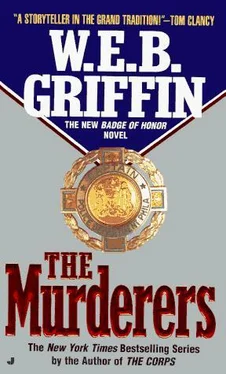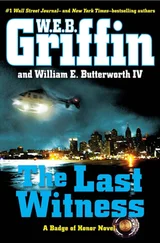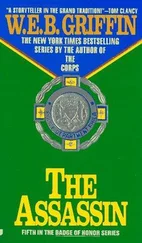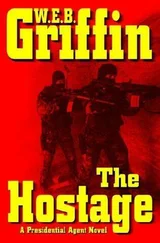W. Griffin - The Murderers
Здесь есть возможность читать онлайн «W. Griffin - The Murderers» весь текст электронной книги совершенно бесплатно (целиком полную версию без сокращений). В некоторых случаях можно слушать аудио, скачать через торрент в формате fb2 и присутствует краткое содержание. Жанр: Полицейский детектив, на английском языке. Описание произведения, (предисловие) а так же отзывы посетителей доступны на портале библиотеки ЛибКат.
- Название:The Murderers
- Автор:
- Жанр:
- Год:неизвестен
- ISBN:нет данных
- Рейтинг книги:5 / 5. Голосов: 1
-
Избранное:Добавить в избранное
- Отзывы:
-
Ваша оценка:
- 100
- 1
- 2
- 3
- 4
- 5
The Murderers: краткое содержание, описание и аннотация
Предлагаем к чтению аннотацию, описание, краткое содержание или предисловие (зависит от того, что написал сам автор книги «The Murderers»). Если вы не нашли необходимую информацию о книге — напишите в комментариях, мы постараемся отыскать её.
The Murderers — читать онлайн бесплатно полную книгу (весь текст) целиком
Ниже представлен текст книги, разбитый по страницам. Система сохранения места последней прочитанной страницы, позволяет с удобством читать онлайн бесплатно книгу «The Murderers», без необходимости каждый раз заново искать на чём Вы остановились. Поставьте закладку, и сможете в любой момент перейти на страницу, на которой закончили чтение.
Интервал:
Закладка:
“Why should Mickey be pissed?”
“All the other press people were here, too,” the Mayor said. “Now, I’m not saying he did anything wrong, there was no way he could have known I figure I owe O’Hara,” the Mayor said, “but when Captain Quaire put out the word to the press that we had solved the Officer Kellog job, I think Mickey got the idea I wasn’t living up to my word. I’d like to convince him that I take care of my friends.”
“No problem. I’ll put the arm out for Mickey,” Lowenstein said. “He’ll have that story all to himself.”
“I was thinking maybe both arrests,” the Mayor said. “You mind if I ask how you plan to handle them?”
And if I said, “Yeah, Jerry, now that you mention it, I do,” then what?
“We’re going to pick up Foley first thing in the morning,” Lowenstein said. “He’s not too smart, and I wouldn’t be at all surprised if we could get him to confess before we arrest Atchison.”
“At his house?”
“As soon as he walks out the door, I don’t like taking doors, and we found out when he goes to work. We’ll be waiting.”
“Who’s we?”
“We is Lieutenant Natali and Detective Milham, backed up by a couple of district uniforms in case we need them. I don’t think we will.”
“And Atchison?”
“I thought-actually Peter Wohl thought, and I agree with him-that it would avoid all sorts of jurisdictional problems if we could get him into Philadelphia, rather than arresting him at his house in Media. So Jason Washington called his lawyer-”
“Who’s his lawyer?”
“Sid Margolis.”
The Mayor snorted. “That figures.”
“And Washington said he has a couple of questions for him, and he thought Margolis might want to be there when he asked him, and could he ask him at Margolis’s office. Margolis called back and set it up for twelve o’clock.”
“Good thinking. You open to a couple of suggestions?”
“Of course.”
“Well, I think Tom Callis would like to get his picture in the newspapers too, and if I could tell him I had set it up for him and O’Hara to be there when you arrest Atchison…”
“No problem. You want to call him, or do you want me to?”
“I’ll call him,” the Mayor said. “And tell him to call you. And I think it would be a nice gesture if you allowed Detective Payne to go to both arrests. It would show the cooperation between Homicide and Special Operations. And what the hell, the kid deserves a little pat on the back. He did work overtime to catch Atchison with the guns.”
“He’ll be there. I’ll call Peter Wohl and set it up.”
“And then, so the rest of the press isn’t pissed because Mickey got the exclusive on the arrests, I thought I’d have a little photo opportunity in my office, like the one this afternoon when I congratulated Officer Bailey, and personally thank everybody, everybody including you and Peter, of course.”
“And including Detective Milham?”
“Of course including Detective Milham. He’s a fine police officer and an outstanding detective who did first-class work on this job.”
They call that elective memory, Chief Lowenstein thought. Our beloved mayor has elected not to recall that the last time we discussed Detective Milham, he was my Homicide detective who can’t keep his pecker in his pocket.
“Good idea,” Lowenstein said.
“I’ll have Czernich set it up,” the Mayor said. “Thanks for the call, Matt, and keep me posted.”
“Yes, sir,” Chief Lowenstein said.
It was necessary for Chief Lowenstein to telephone Mayor Carlucci at his office at ten-thirty the next morning to report that a small glitch had developed in the well-laid plans to effect the arrest of Mr. John Francis Foley.
His whereabouts, the Chief was forced to inform the Mayor, were unknown. When he had not come out of his house to go to work when he was supposed to, Detectives Milham and Payne had gone to his door and rung the bell.
His mother had told him that she was worried about John Francis. He had gone out the night before and not returned. He rarely did that. If he decided to spend the night with a friend, Mrs. Foley reported, he always telephoned his mother to tell her. John Francis was a good boy, his mother said.
“You’re telling me you don’t know where this scumbag is?” the Mayor asked.
“Well, we know he’s not at the Wanamaker’s warehouse,” Lowenstein, more than a little embarrassed, reported. “We’re working on known associates.”
“Speaking of known associates, you do have an idea where Mr. Atchison is right now, don’t you?”
“The Media police are watching his house. He’s there.”
“Find Foley, Matt,” the Mayor ordered. “Soon.”
“Yes, sir.”
“Why don’t you call the police?” the Mayor said, his sarcasm having been ignited. “Maybe he got himself arrested. Or check the hospitals. Maybe he got run over with a truck. Just find him, Matt!”
“Yes, sir.”
Chief Lowenstein replaced the pay telephone in Meagan’s Bar into its cradle. He looked thoughtful for a moment, and then asked himself a question, aloud.
“Why the hell not?”
He dropped another coin in the slot, dialed a number, and told the lieutenant who answered to call the hospitals and see if they had a patient, maybe an auto accident or something, named John Francis Foley. And while he was at it, check the districts and see if anybody by that name had been arrested.
Philadelphia District Attorney Thomas J. Callis was in something of a quandary regarding the prosecution of James Howard Leslie, a.k.a. “Speed,” for the murder of Police Officer Jerome H. Kellog.
Option one, of course, was that he would personally assume the responsibility for prosecuting the case. He knew that if he did that, in addition to the satisfaction he knew he would feel if he was able to cause the full weight of the law to come crashing down on the miserable little sonofabitch, there would be certain political advantages.
The trial was certain to attract a good deal of attention from the news media, print, radio, and television. The good people of Philadelphia could not avoid being made aware time and time again that their district attorney was in the front lines of the criminal justice system, personally bringing a terrible person, a cop killer, to the bar of justice.
The problem there was that there was a real possibility that he might not be able to get a conviction. The fact that there was no question Leslie had brutally shot Kellog to death was almost beside the point here. What was necessary was to get twelve people to agree that not only had he done it, but that he knew what he was doing when he did.
Leslie had asked for, and had been provided with, an attorney from the public defender’s office immediately after being advised of his rights under the Miranda decision.
That fellow practitioner of the law had turned out to be a somewhat motherly-appearing woman, who had spent seven years as a nun before being released from her vows and going to law school.
She had promptly advised Mr. Leslie to answer no questions, and he had not. Tony Callis had often watched the attorney in question (whom he very privately thought of as That Goddamned Nun) in action, and had come to have a genuine professional admiration for both her mind and her skill. He also believed that she had a personal agenda: She truly believed that murder was a sin, and that the taking of life by the state, as in a sentence to the electric chair, was morally no different from what Leslie had done to Kellog.
Her strategy, Callis thought, would be obvious. She would first attempt to plea-bargain the charge against Leslie down to something which would not result in the death penalty.
Читать дальшеИнтервал:
Закладка:
Похожие книги на «The Murderers»
Представляем Вашему вниманию похожие книги на «The Murderers» списком для выбора. Мы отобрали схожую по названию и смыслу литературу в надежде предоставить читателям больше вариантов отыскать новые, интересные, ещё непрочитанные произведения.
Обсуждение, отзывы о книге «The Murderers» и просто собственные мнения читателей. Оставьте ваши комментарии, напишите, что Вы думаете о произведении, его смысле или главных героях. Укажите что конкретно понравилось, а что нет, и почему Вы так считаете.











